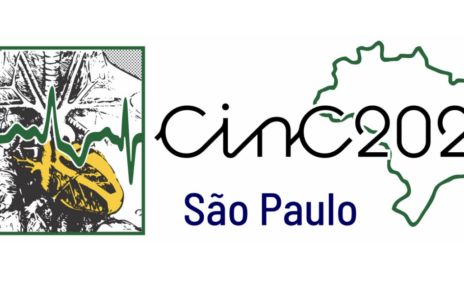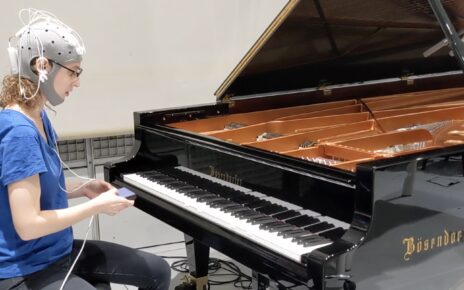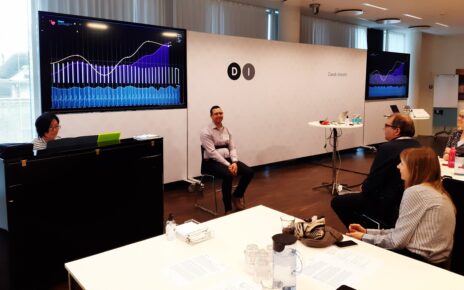We are looking to fill a music-physiology data science doctoral scholarship which is now open to international applicants for October 2023 entry. The successful applicant will join the research team of the ERC COSMOS project.
About the Project
This research project, supervised by Prof Elaine Chew and Prof Pier Lambiase, brings together computational modelling of music and of the heart to explain cardiac response to performed music. The scientific approach will be based on building analytical models of the interactions between expressive music parameters such as loudness, tempo, phrases, and boundaries, and cardiac measures such as QT intervals from electrocardiographic traces, activation recovery intervals from intra-cardiac electrographic tracings, and autonomic variables (heart rate heart rate variability, respiration, blood pressure).
Musicians vary musical attributes such as loudness, tempo, timbre, and articulation to convey segmentation and prominence, to disambiguate structure, and to communicate emotion. The varying of these musical properties have a direct impact on the reception of the music and on the listeners’ hearts. These music parameters can be quantified or extracted from music data (or expressive music generated from the parameters), and can then be linked to physiological measures to build personalised models of cardiac response to music.
The research activities will focus largely on computational modelling, and analysis, evaluation, and interpretation of results, but may include study design, ethics application, data collection, and data processing. The student is expected to liaise regularly with the supervision team to discuss research progress, and for guidance and feedback, and to disseminating research results through publications and conference presentations.
The ideal candidate will be knowledgeable in Python, Matlab, or R, and have a Bachelors or Masters degree in biomedical engineering, operations research or statistics, music information research, or a related discipline. Experience in analysis of biosignals and/or music signals is desirable.
The research activities will be carried out in partnership with the ongoing European Research Council project COSMOS, Computational Shaping and Modeling of Musical Structures (cosmos.isd.kcl.ac.uk), and its accompanying Proof of Concept project HeartFM, Maximizing the Therapeutic Potential of Music through Tailored Therapy with Physiological Feedback in Cardiovascular Disease (heartfm.kcl.ac.uk).
The project is at the intersection of music science and cardiovascular science. Outcomes of the project will provide an evidence base and computational tools for digital therapeutics in music and cardiology. The PhD will prepare you for a career in digital health and digital therapeutics in both research and industry.
To be considered for the position candidates must apply via King’s Apply online application system. Details are available at:
The selection process will involve a pre-selection on documents, if selected this will be followed by an invitation to an interview. If successful at the interview, an offer will be provided in due time.
Additional application instructions:
– Under Supporting Statement, list “Elaine Chew” as the King’s supervisor you would like to study under.
– Under Funding, select [ ] 5. I am applying for a funding award or scholarship administered by King’s College London; Code: “Engineering PhD Studentship.”
– A research proposal is not required as this is an advertised project.
– A decision must be made in June for an October 2023 start.
Funding Notes
Funding is available for 3.5 years (covering Tuition fees, Stipend plus London Allowance, Bench Fees/Research Training & Support Grant). It covers tuition fees for UK or International students and a tax-free stipend of approximately £19,668 p.a. with possible inflationary increases after the first year.
References
Bedoya, D., L. Fyfe, E. Chew (2022). A perceiver-centered approach to the representation and annotation of prosodic functions in performed music. Frontiers in Psychology: Performance Science, special issue on selected papers from the International Symposium on Performance Science 2021 conference, doi: 10.3389/fpsyg.2022.886570 .
Bernardi, L, Porta, C, Casucci, G, Balsamo, R, Bernardi NF, Fogari, R, Sleight, P (2009) Dynamic Interactions Between Musical, Cardiovascular, and Cerebral Rhythms in Humans. Circulation 119: 3171-3180
Chew, E., P. Taggart, P. Lambiase (2019). Cardiac Response to Live Music Performance: Computing Techniques for Feature Extraction and Analysis. In Proceedings of Computing in Cardiology (CinC), A*STAR, Singapore, 8-11 September 2019.
Palmer, C, Hutchins, S (2006). What is Musical Prosody? Psychology of Learning and Motivation, 46:245-178.
Image “Musical notation and a heart” is licensed under the Creative Commons Attribution-Share Alike 3.0 Unported license.




